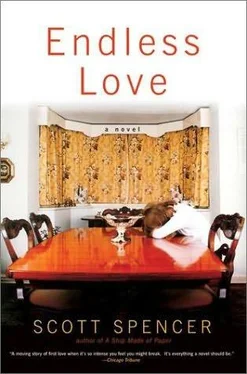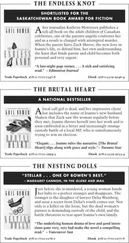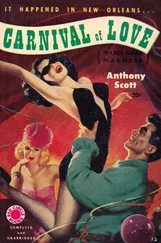Posted in front of Ann’s building was a middle-aged man with long graying hair and thick, wire-framed glasses. He was hosing down the sidewalk, and when I passed him he redirected the stream of water just enough to allow me to walk by without getting wet. I was dizzy with anxiety; everything felt dangerous and unstable. The heavy doors leading to the lobby were covered with thick decorative grillwork, the sort I would now call Art Deco-ish but which then seemed creepily fancy. Of course those doors had been opened and closed for decades by young children and enfeebled old people, but that day it took all my strength to push them open—my arms felt as if all the bones had been removed and my blood had been exchanged for scalding weak tea. The lobby was small, cool, and lined with green marble. There were a hundred or so buzzers next to a locked glass door. As I searched for Ann’s name, my eyes moving sporadically from column to column, the glass door suddenly opened. It was a beautiful young woman. Her face was at once pale and Egyptian. Prancing excitedly at her side were two largish dogs, an Airedale of sorts and a German shepherd. The shepherd sniffed passionately at my thighs. “Judy!” the woman whispered and yanked the dog’s leash. Then, to me, she said, “Are you all right?”
I nodded but a large part of me must have been looking for help because involuntarily I placed my hand on the back of my neck and squeezed.
The woman snapped her fingers and her dogs sat. They were both panting deliriously. “You sure?” she said. “You’ve got that look.”
“What look?”
She raised her hand and cupped it the way you would to swim. Then, as she lowered it again, she made a whistling sound that ended in an explosion.
“I’m all right,” I said, glancing away. My eyes landed on Ramsey—7G.
“You’re sure? I don’t want to come back from the park and find you lying on your back.”
Oh my God she’s so beautiful, I thought. What’s happening to me? She wore wheat-colored pants and a sheer blue shirt with the sleeves rolled to the elbow. Her arms were narrow and hard—long muscles, prominent veins and tendons: you’d have to be half mad not to want those arms to hold you.
“Is there a phonebooth around here?” I asked. It was clear I couldn’t just ring Ann’s bell; I would have to warn her, give her a chance to avoid me.
“Yes. Right on the corner,” She glanced down at her dogs and they stood up, their tails straight up and wagging. I struggled to open the heavy door and we walked out. The superintendent was still hosing the sidewalk. He had the water aimed at a peanut shell, which he powered along the sidewalk and finally off the curb and into the gutter. The dogs quickly licked the wet pavement. “Hello, Rolf,” said my companion.
Rolf nodded. “Hello, Miss LaFarge.”
She walked with me to the corner and stopped at an old phonebooth. “Sit Judy, sit Steve,” she said. She reached into her pocket and pulled out a dime. “Here,” she said, putting it in my hand. “Do you want me to stay here while you make your call?”
“No. I’m fine. Thanks, though.”
She walked across Park Avenue with her dogs. I watched her walk away, repeating her name to myself and wanting to know her. Though loneliness and aimlessness had led me into a languid, circular friendship with a woman in Warren Hawkes’s set of friends, this Miss LaFarge awakened in me an intimation of desire that in an instant made her totally distinct from anyone I’d met or even noticed since the beginning of my exile from Jade. I felt her presence drifting within me like sunlight in a dark wood and I knew that she felt my thoughts as they followed her. It was life as dream, afternoons as eternity, it was all manner of leaps of meaning, all varieties of mental magic, it was the world luminous and transparent once again—just as it was when I fell asleep in Jade’s embrace and woke with her hair on my pillow. I dropped the dime into the slot and broke off the dial tone with the first digit of Ann’s number. I was still shaking, still sweating and dizzy, but now it didn’t seem like dread or confusion; it was the change in gravity as I entered now the first and soon the second ring of the only world I believed in, the only reality I wanted to call my own. It hardly mattered if I should quake or faint dead away; I was in a field of force, of emotion raised to the pitch of physics, and it was rhapsodically larger and more powerful than anything else I’d known, finally and at last.
I didn’t remember dialing the rest of her number and didn’t hear the phone ring but there was Ann’s voice. “Hello?” She always said it as a question, a secret, slightly embarrassing question.
“It’s me,” I said. It never occurred to me that she wouldn’t recognize my voice. “I’m twenty-five feet away from your house. Can I come up? Or would you like to go out for coffee?”
There was silence on her end of the line. I heard classical music in the background and a police car siren that was just then racing north past me, throwing its stuttering red light against the glass of the phonebooth. “Is this who I think it is?” Ann finally said. Her voice was casual. I knew she recognized me and the lack of emotion in her voice both disappointed and reassured me. Clearly, she was not about to weep with joy over my appearance, but neither was she treating me like some armored insect found beneath a rock.
“Can I come up?” I said. “I just came in today. I’m staying at a hotel. I’d like to see you. We can talk.”
“I’ve been having so many visitors,” Ann said. “Keith’s been camping out on the sofa.”
“He’s there now?”
“No, he went home this morning.”
“Can I come to see you, Ann?”
She paused for a moment. “If you like,” she said. She waited an instant for my reply and then hung up.
I went back to her building, rang her bell, and Ann buzzed me in. A small wood-paneled elevator took me to the seventh floor. A conventional sense of anticipation told me I should be busy imagining what it would be like to finally be with Ann, or what I would say, but the future stood with its back to me, warning me not to even try to look in its face. The elevator stopped with a slight lurch and I stepped into a wide hall—white ceiling, faded pink walls, brightly polished black floors. Ann’s apartment was at the very end. The door was freshly painted white and the doorknob was intricately textured lead, round and as large as a croquet ball. I knocked and waited. There was a knot in my leg muscle, painful I suppose, but I barely noticed; it rose through me like a bubble up the stem of a syringe. I knocked again and finally there was the sound of Ann’s footsteps.
She was dressed in a floor-length pale green robe, bordered in a darker green, with those medieval hanging sleeves. Her dark hair was pulled back and she looked at me through large, faintly tinted eyeglasses. She smelled of perfume and her painted toenails poked out of gold-braided slippers. In one hand she held a copy of Ariel by Sylvia Plath and her other hand was clamped on her hip. She looked totally self-possessed.
“You know I don’t like surprises,” Ann said. “And you won’t stop surprising me.” She didn’t ask me in but she moved to the side so I came forward. We were in a long, narrow corridor. The walls were covered with prints and drawings, including a Dutch railway poster that used to hang in the second-floor hallway on Dorchester, between Ann and Hugh’s bedroom and Sammy’s. That it had survived the fire amazed me.
“You still have this,” I said, gesturing toward the poster—it showed a Peter Lorre-ish man opening the door of an olive- colored railway car.
“No. It’s not the same one. I found it in an antique store on Second Avenue. One hundred and fifty dollars. I starved for a month but I wanted it.”
Читать дальше












